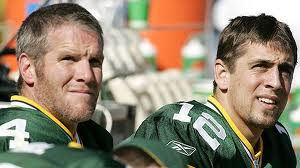Ask yourself this question: would you consider the past twenty one seasons a failure for the Green Bay Packers?
Seems like an odd question to ask, doesn’t it?
Considering that the time frame in question has brought two Super Bowl titles to Green Bay (as well as one loss) should hardly qualify as a failure by anyone.
Yet a recent article by Mike Woods in the Appleton Post Crescent suggests that very thought-that the past twenty one seasons have been a disappointment for the Packers.
The focal point around the summation that there has been disappointment is the continued success of the quarterback play during the period in question.
The Packers have been fortunate to have two high caliber players at the position for an extended period of time, first by Brett Favre and succeeded by Aaron Rodgers. A combined four MVPs between them helped lead the Packers to victories in Super Bowl 31 and 45, and increase the Packers League Championship total to an NFL record thirteen during this time.
What causes the author to call the Packers period of success ultimately a disappointment is the San Francisco 49ers record during a nineteen season period for them in the 1980s and 1990s.
They were also fortunate to see a long period of superior quarterback play, first by Joe Montana and later by Steve Young. Their four Super Bowl victories in two fewer seasons is two more than the Packers have seen during their renaissance which began in 1992. Despite their two victories in the biggest game on the biggest stage, Woods dismisses them, almost as though they were by accident:
In 21 years, the Favre-Rodgers combo have combined for three Super Bowl appearances and two wins. Certainly by no means a failure, but compared to what Montana-Young accomplished in two fewer years, it could be classified a disappointment.
If two Super Bowls wins in 21 seasons is a disappointment, I’ll take it any day.
Winning a Super Bowl is a total team effort. It does not sit solely on the shoulders of the quarterback. While they may be considered the most important player on the field, it is the combined efforts of all players which helps guide a team to total success.
The 2010 Packers are a perfect example of this. While Aaron Rodgers had a statistically excellent season, the Packers greatly benefited by having the 5th overall ranked defense, as well as solid play from their previously questionable Special Teams. In fact, if not for a game changing performance by Tim Masthay in the NFC Championship Game, the Packers may not have advanced on to Super Bowl 46.
The 2011 Packers are another great example of how individual play by one player does not guarantee ultimate success. Aaron Rodgers had the best statistical season by any quarterback in history during 2011. And the Packers fielded one of if not the worst defense in NFL history during this season. The defense was ultimately their undoing, bowing out in the first round of the playoffs after a league best 15-1 regular season record.
Looking back even further into the Packers record books, Favre had more than a few seasons during his tenure where his individual play was more than enough to lead the Packers to success. A good example of this is 2004 which was a statistically strong season, for Favre, yet the defense struggled severely, giving up 380 points, and the prime reason the Packers failed in the playoffs.
Each of these seasons are proof that the quarterback cannot dictate the success of the team single handedly. It is the combined efforts of all players. But because of the focus the quarterback receives, he will either receive the majority of the spotlight, or receive the majority of criticism, as Favre and Rodgers received in the article by Mike Woods.
For twenty one seasons, the Packers have been perennial contenders in the NFL. The play of Brett Favre and Aaron Rodgers has been a major reason for this success. But to say that two Super Bowl titles during this time is a failure is a slight against the teams which did win. There are many teams who would give anything for consistent quarterback play, let alone Super Bowl trophies.
Aaron Rodgers is not yet 30 years old. He has said he wants to play another eight seasons for the Packers. While I hope the Packers win multiple championships during this time, there are no guarantees that they will. And if they do not, there is no way I would say the thirty years (by that point) would be considered a disappointment. Two championships during that time is better than most teams could ever achieve.
Just ask the Lions.


3 responses to “Brett Favre and Aaron Rodgers: Twenty One Seasons of Green Bay Packers Success”
Woods analogy with the 49ers is flawed at best. The salary cap wasn’t a factor for most of that period and teams throughout the NFL are better at managing rosters now, leaving less premier free agents to hit the market to provide help to the top teams.
Those are both great points, and I did consider addressing them in this response to Woods. But it seemed like he was unfairly using the QBs as the focal point of his argument, so for the sake of discussion I did the same.
There are so many teams that would love to have multiple championships over a 20 year period. The way the Packers titles were basically dismissed by Woods irritates me greatly.
If a SB title is the only measure of success, then 2 SB wins in 21 years is actually quite good. Ask the fans of any of our divisional opponents if they’d take 2 wins and 3 appearances.